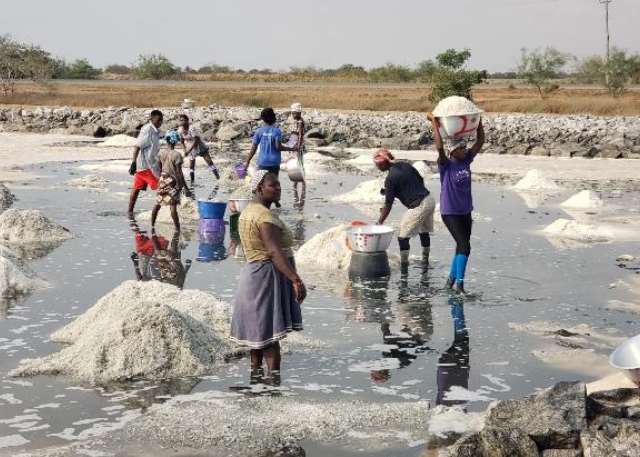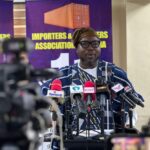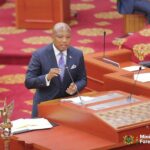The Member of Parliament for the Sege Constituency in the Greater Accra Region, Mr. Daniel Keshi Bassey, has warned that emerging livelihood issues surrounding the government’s 15-year lease of the Songor Lagoon to private investor Electrochem pose a significant threat to national security.
Speaking on Bullet TV’s breakfast show, hosted by Nana Yaw Fianko and Seli Acolatse Apaloo, the lawmaker expressed concerns that the investor’s activities have prevented many farmers from accessing their lands, thereby depriving them of their livelihoods.
He stated: “According to a memorandum I reviewed, my chiefs allocated approximately 12,428 acres of land to an investor. I checked with SIGA, and they reported the same figure of 12,428 acres granted to a developer. However, somehow, this developer is now claiming a total of 41,000 acres, leaving local farmers without land. As a result, people are turning to petty crimes, teenage pregnancies are increasing, and the community is left with nothing to sustain itself.”
Expanding on the issue, Mr. Bassey warned: “We are sitting on a time bomb with the Songor Lagoon situation. If I am denied access to my traditional source of livelihood, I will resort to anything to survive. That ‘anything’ could mean crime, theft, or worse. If you leave your motorbike unattended for a moment, it might not be yours when you return. If you step away from your freight tricycle, someone else might claim it.”
According to him, the situation has led to a rise in social vices as locals lose their farmlands to the private investor.
Mr. Bassey further stated that he and fellow Ada MP, Comfort Doyoe Cudjoe, plan to engage local chiefs from the two constituencies to discuss the impact of the Songor Salt Project on residents.
When asked how 12,428 acres became 41,000 acres, Mr. Bassey explained: “Electrochem claims that the additional land was granted to them by the chiefs. There are many conflicting stories, and I don’t know which side to believe. However, any serious investor should understand that consistent resistance over three and a half years is a sign to reassess their approach. You need peace of mind to develop your project and recoup your investment.”
He emphasised that even if the chiefs had granted the company 41,000 acres, the investor should still consider the needs of the local people who have relied on the land for generations.
“So, should everyone sit idly by, fold their arms, and starve?” he questioned. “Why not engage the locals in dialogue and find a compromise? I once suggested this to the investor over the phone, and he told me he would think about it.”
Reflecting on the broader implications, Mr. Bassey noted: “When we die, our space is only 6 feet by 4 feet—maybe 7 feet if you’re taller. So why must we fight, kill, and cause harm over money? How much do we really need to survive each day? No state should prioritize an investor’s interests over the well-being of 84,000 people. Even the investor should recognize that this situation is a security threat. Prioritising one company over nearly 200,000 people across the two constituencies is a serious issue, yet no one seems to be addressing it. The leadership of Ada is turning a blind eye simply because they are not directly affected.”
He added: “When the affected people have exhausted all options, they will eventually turn to those who ignored them. Opinion leaders dismiss any dissenting youth as disrespectful, but what happens when someone cannot feed, clothe, or even sleep well? Meanwhile, they can see the very resources they have depended on for years being taken away.”
However, Mr. Romeo Adu Ardey, a member of the Coalition of GaDangme Pressure Groups, dismissed the allegations against Electrochem as baseless.
“We heard rumours that Electrochem had taken over the Songor Lagoon and was making life difficult for the locals. So, we decided to investigate as a pressure group. Contrary to what is being said, the company is doing remarkable work. If allowed to operate peacefully, their vision could address many of the complaints, such as youth unemployment and rising social issues,” he argued.
Mr. Ardey challenged the claim that Electrochem had taken over farmlands, saying, “That is not true. I invite Bullet TV to visit the site, speak with the company, and see firsthand the work being done—it will surprise you.”
He further explained: “Electrochem was granted a 41,000-acre concession through a 15-year lease ratified by Parliament to mine salt in the Songhor Lagoon and its surrounding lands. This was a legal process, yet my brother, the Sege MP, makes it sound as if the land was seized arbitrarily. The Songor Lagoon alone covers about 28,000 acres, which floods during the rainy season, making it unsuitable for salt mining. As a result, the salt pans have to be located on the outskirts.”
“In reality,” he continued, “the land available for salt mining is less than 41,000 acres. Allegations about desecrating the Yonmo shrine are also false. The shrine, which occupies over 1,000 acres, has been left untouched and is even being protected by the company. Similarly, cemeteries and local communities within the concession remain intact. So, when people claim their farmlands have been taken away, that is pure sensationalism—it is simply not true,” Mr. Ardey concluded.






